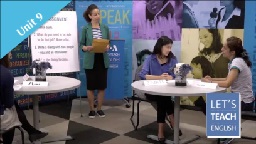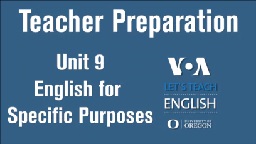|
|
| |
|
|
| |
|
|
|
|
| |
 Let's
Teach English Unit 9 Let's
Teach English Unit 9
The Let’s Teach English video series offers free online
training for English language educators worldwide. It is
based on the Women Teaching Women English text for
adult, beginning level learners. Voice of America and
the University of Oregon are partners on this project. |
|
|
|
Click to see the full PDF lesson -
opens in a new window. |
|
 Unit
9: English for Specific Purposes and Vocational Language Unit
9: English for Specific Purposes and Vocational Language
In this lesson, students work on an independent project.
Each student researches a job and creates an interview
dialog for someone trying to get that job. During class,
the students practice their interview role-plays with
one another. Then, they perform them with partners for
other students in a small group.
As the first pair is doing their role play, the teacher
stops to ask them to predict what the next question will
be. Predicting is a learning strategy that can help
academically as well as in a real-life situation, such
as a job interview.
They also give each other feedback, using the checklist.
Large classes can still do this type of speaking
activity by performing in pairs and small groups. |
Teacher Preparation Video
This episode shows a model of teaching English for Specific Purposes and
vocational use of English. |
|
 Video Transcript Video Transcript
Narrator: In this lesson, students perform an interview dialog(ue) in pairs.
Their
homework was to research skills needed for a job they want. As one pair
performs, the teacher asks the class to predict questions that will be
asked. |
|
|
Teacher: Good morning.
Students: Good morning.
Teacher: What did we talk about in our last class?
Emma: We talked about different kinds of jobs.
Teacher: Right. And what was your homework? Mimi, please read the project
assignment to help us remember.
(The teacher points to each instruction as Mimi reads.)
Mimi: 1. Choose a job. 2. What do you need to be able to do that job? Make a
list. 3. Write a dialog(ue) with two people – you and an interviewer. 4.
Bring the dialog(ue) to class.
Teacher: Good. Did you bring your interviews?
Students: Yes.
Teacher: Now, I'm going to give you time to practice your interviews. Then
you will
do them as a role-play.
(Students practice interviewing each other.)
Teacher: Okay, your practice went well. Now, let's watch one interview
together.
Who would like to share with the class?
(Jamie and Maryam raise their hands to volunteer.)
Teacher: Great!
(The teacher addresses the other group.)
Teacher: Emma and Mimi, while you watch, look at the checklist and write
your
answers.
(The teacher shows the checklist.)
Jamie: I’m trying to get a job as a reporter. Maryam is going to interview
me.
(Jamie and Maryam exchange interviews.)
Jamie: Reporters need to study journalism. They like to write and talk to
strangers. And sometimes they need to travel too.
Teacher: Okay! Are we ready?
Jamie: Yes.
Maryam: Good morning, Ms. Zhong.
Jamie: Good morning, Ms. Abbasi.
Maryam: Let’s begin. Why do you want to be a reporter?
Jamie: I like to write and talk to people.
Maryam: Good. Can you give me an example?
Jamie: I love to write about politics. I follow the news every day.
Teacher: Good! Let’s stop for a minute. Now, let’s guess or “predict.”
(The teacher points to the word “predict” on the wall.)
Teacher: What question is Maryam going to ask next? Mimi, what do you think?
Mimi: Hmm . . . I think she will ask, "Are you good with computers?"
Teacher: Good. Emma, what do you think?
Emma: Hmm . . . "Can you make videos?"
Teacher: Good guesses. Now, let’s listen and find out.
(Maryam resumes the interview.)
Maryam: How are your skills with technology?
Jamie: I can work with video, and I am very good on computers.
Maryam: One last question. Are you able to travel?
Jamie: Yes, I love to travel.
Maryam: Wonderful. We will call you soon.
(Jamie and Maryam stand up and shake hands.)
Jamie: Thank you for your time. I would very much like to work with you!
Maryam: Goodbye, Ms. Zhong.
Jamie: Goodbye, Ms. Abbasi.
(The teacher and students clap.)
Teacher: Thank you, Maryam and Jamie. Nice work! Mimi and Emma, what about
the things you predicted?
Mimi: I was right. She asked about technology.
Emma: Yes, she answered that question with information about her computer
and
video work.
Teacher: Exactly! Those were good predictions.
Narrator: After students practice their interviews in pairs, they perform
them for
another pair of students. They also give each other feedback using the
checklist.
(The teacher talks to the group that was listening and had checklists.)
Teacher: Please write your answers on your checklists.
Emma: After that, what do we do?
Teacher: Practice your interviews with at least two other people.
Mimi: Where do we put our checklists?
(Mimi holds up her checklist.)
Teacher: At the end of class, put all of your checklists in this envelope.
(The teacher holds up the envelope.)
Teacher: I will give them back to you in our next class.
Narrator: This experience gives the students practice using English that is
related
to their career goals. Next time, join us for Unit 10. We will teach
collaboration through persona poems. |
|
Transcript Vocabulary
dialog(ue) (noun) – the things that are said by the characters in a story,
movie, play,
etc.
predict (verb) – to say that (something) will or might happen in the future
© 2017 University of Oregon and Voice of America. This work is based on the
Women Teaching Women English materials
produced by the University of Oregon American English Institute under U.S.
Department of State Federal Assistance Award
S-LE200-10-GR-050, issued by the U.S. Embassy Beirut. |
|
|
|
|
|
|
|
|
|
|
|
|
Grammar Tips |
Can You Catch These Native Speaker Mistakes?
(Beginner - Listening)
An audio lesson to
help with your understanding of common mistakes. The English is
spoken at 75% of normal speed.
Click here to visit the lesson page with the written script for this
audio program. |
Commonly Confused Words: Part One
(Beginner - Listening,
reading)
A video lesson to
help with your understanding of commonly confused
words.
The English is
spoken at 75% of normal speed.
Click here to visit the lesson page. |
Commonly Confused Words: Part One
(Beginner - Listening)
An audio lesson to
help with your understanding of commonly confused
words. The English is
spoken at 75% of normal speed.
Click here to visit the lesson page with the written script for this
audio program. |
Commonly Confused Words: Part Two
(Beginner - Listening,
reading)
A video lesson to
help with your understanding of commonly confused
words.
The English is
spoken at 75% of normal speed.
Click here to visit the lesson page. |
Commonly Confused Words: Part Two
(Beginner - Listening)
An audio lesson to
help with your understanding of commonly confused
words. The English is
spoken at 75% of normal speed.
Click here to visit the lesson page with the written script for this
audio program. |
|
|
|
|
Search Fun Easy English |
|
|
|
|
|
|
|
|
|
|
|
|
|
|
|
About
Contact
Copyright
Resources
Site Map |